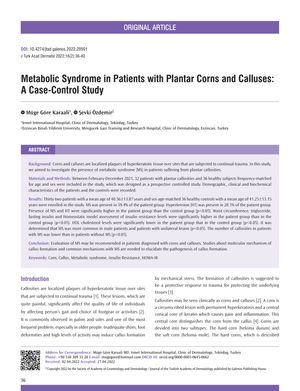Metabolic Syndrome in Patients with Plantar Corns and Calluses: A Case-Control Study
June 2022
in “
Journal of the turkish academy of dermatology
”

TLDR People with plantar corns and calluses may have a higher chance of having metabolic syndrome.
In a case-control study with 32 patients with plantar callosities and 36 matched healthy controls, it was found that 59.4% of the patients had metabolic syndrome (MS), a significantly higher rate than the control group. These patients also had higher waist circumference, triglyceride levels, fasting insulin levels, and HOMA-IR levels, along with lower HDL cholesterol levels. MS was particularly more common in male patients and those with unilateral lesions. The study suggests that patients with corns and calluses should be screened for MS due to its potential to induce cardiovascular diseases. The link between MS and callus formation is not fully understood, indicating a need for further research into the molecular mechanisms involved. The study's limitation is its small sample size, which may affect the generalizability of the results. Ethics approval was obtained, and there was no financial support or conflict of interest declared.




